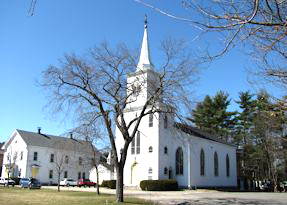Thoughts from our Ministerial Intern
By Elizabeth Foster, February 25, 2023
Rev. Clyde wrote about covenant in last month’s newsletter, and now it’s my turn! One reason we’re focusing on covenant this year is the recently-released report of the Article II Commission, which is taking a look at our Principles and Purposes to help us think about the denominational covenant we all share. The other is that, as Rev. Clyde has reminded us, it is good for us to periodically review our own congregational covenant and think about the ways in which we are living into it, and the ways in which it is serving us now.
If you ask UUs to briefly describe their faith, they will often reply that it is “covenantal, not creedal.” But what does living into covenant really mean to us? The word covenant comes from the Latin roots meaning “to go with.” The UUA report Unlocking the Power of Covenant speaks of covenant as the basis of our UU theology, calling it “an antidote to individualism,” and argues that it commits us theologically to interdependence with other people and with the universe as a whole. This report also tells us that there are different kinds of covenant, including aspirational covenants, like our own covenant, and behavioral covenants, like the covenants used in our RE classrooms and small groups.
There are some beautifully-written aspirational covenants in our denominational history; Rev. James Vila Blake, minister of my home church in Evanston, IL, wrote one of the most popular, in 1894, which reads, “Love is the spirit of this church, and service is its law. This is our great covenant: To dwell together in peace, to seek the truth in love, and to help one another.” But personally, my most meaningful experiences with covenant have taken place in Sunday School classrooms. I truly believe that our children are creating the most vibrant, functional covenants in our denomination today. Each time I’ve taught RE, the class has established a covenant. And because we had all signed it and created it together, when I or their classmates needed to call one of the students into covenant, it changed from a disciplinary action into a reminder of a shared promise. A congregational or denominational covenant might look a little different (hopefully we won’t have to remind anyone not to get glitter all over the floor!), but these lived covenants can still inspire us in our discernment process. Other contemporary sources of lived covenant include the disability justice movement, and other social justice spaces.
This June, Unitarian Universalists will vote on the changes to our principles and purposes proposed by the Article II Commission, potentially creating a new covenant among UU churches across our Association. As we get closer to GA, Rev. Clyde and I will be creating additional opportunities to talk about Article II and these proposed changes, as well as opportunities to reflect on our own covenant here at First Parish. In the meantime, we’d love to hear about your experiences of covenant. What does covenant mean to you?
Elizabeth

